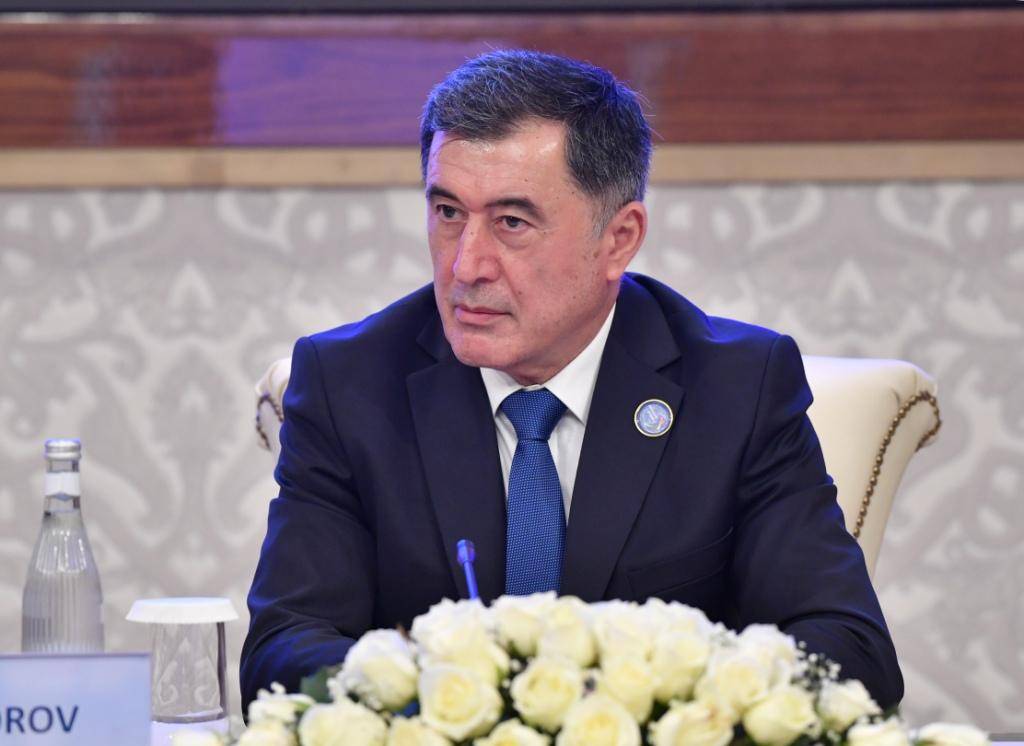Remarks by the Minister of Foreign Affairs of the Republic of Uzbekistan Vladimir Norov at the briefing following the EU-Central Asia Connectivity Conference: Global Gateway for Sustainable Development

18 November 2022, Samarkand
Good afternoon, dear representatives of the media!
Today we have held the first European Union-Central Asia Connectivity Conference: Global Gateway for Sustainable Development.
The high-profile composition of the event’s participants testifies to their commitment to further deepen the dialogue in order to promote sustainable regional connectivity.
In this regard, we suggested to make this forum regular, to enable us to hold fruitful negotiations and develop coordinated approaches to strengthen the connectivity between Central Asia and the European Union.
We called the European side to actively use the existing opportunities for the implementation of infrastructure projects in Central Asia in 3 key areas - sustainable transport connectivity, digital transformation and the "green" transition, which are in line with the priorities of the national development strategies of the region’s countries and the EU's Global Gate Strategy.
Dear journalists,
We believe it is important to carry out a systemic work with the EU and its member-states on the development and implementation of programs for the development of transport connectivity of our region with Europe, accounting for the key provisions of the EU’s Strategies for Central Asia.
We proposed to hold the EU-Central Asia meeting to discuss the harmonization of customs procedures, adoption of through tariffs and creation of an integrated digital network along the Trans-Caspian route.
We believe it is necessary to develop a long-term strategic program for the improvement of transport and communication connectivity, accounting for the relevant aspects of the EU's Global Gateway Strategy.
Dear friends,
Digital transformation of economies is among key priorities of the development of our states.
We support the efforts of the European side to strengthen digital connectivity both within our region and between the EU and Central Asia, especially in the areas of governance, social services, industry, healthcare, education, finance and agriculture.
Primarily, we are talking about creating a digital corridor from Europe to Central Asia through the South Caucasus.
The time has come to adopt a separate EU concept “Digital Agenda for Central Asia” that could be implemented as part of the Digital Europe program launched last year.
We believe it could also be possible to develop joint investment programs for the improvement of data infrastructure: data centers and Internet traffic exchange points.
In order to discuss the practical implementation of deepening digital connectivity, we proposed to host the EU-Central Asia expert meeting.
We are pleased that at today’s conference, the European side presented a new regional project to strengthen digital connectivity in Central Asia (budget - 40 million euros) to be implemented jointly with the EBRD and EIB as part of the Europe Team initiative.
We are confident that this project will contribute to the provision of high-speed broadband fiber optic communications in our region.
Ladies and gentlemen,
Accelerated transition to a green economy, introduction of renewable energy sources and sustainable use of water resources are among the priority areas of cooperation between Central Asia and the EU.
The participants supported the idea of holding the next EU-Central Asia High-Level Conference on Environment and Water Resources in February 2023 in Rome.
They noted the need to develop a specific action plan in this area as part of the conference.
We do hope for the continuation of mutually beneficial cooperation in this field.
Our region has enormous reserves of energy resources, whose development shall require significant and stable investments.
We invited the EU to take an active part in the development of various options for the extraction and transportation of Central Asian energy resources in cooperation with other stakeholders.
The countries of the region urged the European side to take advantage of the EU’s Program on Sustainable Energy Connectivity in Central Asia for implementation as part of the Green Agenda for Central Asia program adopted by us.
They also welcomed the initiative presented today by the European side on water resources, energy and climate change in Central Asia. It provides for the integration of the EU’s and its member-states’ ongoing and new projects in the region (with a total budget of about 700 million euros), implemented jointly with the EBRD and EIB as part of Europe Team initiative.
Tourism, which is viewed as a reliable driver for ensuring the stable growth of our economies is one of the incentives for strengthening economic ties between Central Asia and Europe as well.
In this regard, we expressed our readiness to host the EU-Central Asia Tourism Forum next year in Uzbekistan.
Dear journalists,
In conclusion, I would like to note that the last two days have been very eventful in relations between Central Asia and the European Union and enabled us to discuss a wide range of issues of bilateral and interregional agenda.
I am confident that the Samarkand Conference gave a powerful impetus to further strengthening our interregional dialogue on connectivity and has elevated it to a qualitatively new level.
We hope that this format of interaction and collaboration between Central Asia and the EU will further strengthen and become regular.
Thank you for your attention.











